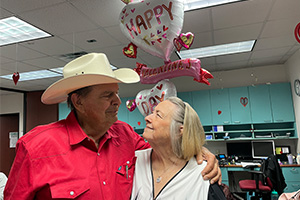Patient credits heart failure practitioners and family support with his survival
Feb 21, 2024
Carl Hoefelmeyer thanks his wife, Nelda, on Valentine’s Day, Feb. 14, for her love, care and support.(San Antonio, TX) – February is American Heart Month and the perfect time to remind your loved ones to take care of their hearts. This is something heart failure patient Carl Hoefelmeyer, and his wife Nelda, want to do by sharing their personal story. They both agree that one of the most important messages the community should know this February and every day is: Keep your heart healthy so you can live and enjoy life and your family.
Hoelfelmyer is among more than 6 million adults in the United States living with heart failure.
“My doctor told me I wouldn’t live past 55,” Hoefelmeyer said. “After two heart attacks, triple bypass surgery and my heart failure condition, here I am now 76 years old and my heart is still ticking.” Today, Hoefelmeyer continues to run cattle on his south side ranch, operates his fencing company, and he and his wife, Nelda, will celebrate their 55th wedding anniversary this summer. He is proof heart failure does not mean a death sentence.
Carl Hoefelmeyer is a patient of Sonja Brune, M.S.N., APRN, at the Heart Failure Clinic of San Antonio-Baptist Medical Network. Brune is an advanced practice heart failure practitioner within the Baptist Medical Network who works closely with heart failure patients and their physicians to provide a comprehensive team approach to caring for the patient.
“Heart failure is a condition in which the heart can no longer meet the demands of the body,” Brune said. “It doesn’t mean the heart is going to stop. It means that the heart is either too stiff to fill with blood to adequately pump blood through the body or it’s too weak once it does fill with blood to adequately pump the blood throughout the body.” Brune said most often, heart failure is caused by another medical condition that damages the heart. This includes coronary heart disease, heart inflammation, high blood pressure, cardiomyopathy, or an irregular heartbeat.
She said some of the most common symptoms of heart failure can include:
- shortness of breath
- chest pain
- weakness
- fatigue
- lightheadedness
- swelling
Because symptoms can mimic other disorders, Brune said it is important to see a primary care doctor, a cardiologist and to have a team of specialists for diagnosis and treatment.
“Heart failure is not a death sentence,” Brune said. “With the good follow up, seeing the right professionals, taking the right medications and following recommended lifestyle changes, heart failure patients can continue living a very long and productive life,” she said.
Hoefelmeyer said the Heart Failure Clinic of San Antonio-Baptist Medical Network, along with support and care from his wife Nelda, and his family, has helped him to continue living a fulfilling life. “We drive about 40 miles from our home to see Sonja Brune at the clinic,” Hoefelmeyer said. “She takes very good care of me,” he said.
Brune said the Heart Failure Clinic of San Antonio-Baptist Medical Network is designed to care for the sickest patients with heart failure by offering patients:
- Swift follow-up care with the goal of seeing patients within three days of discharge after hospitalization
- Same-day appointments for established patients who are feeling ill
- Close follow-up care, monitoring and management to heart failure patients to help identify any early signs of worsening symptoms to address and to keep the patient as healthy as possible for as long as possible.
In addition to high quality medical care, Brune said that patients who surround themselves with a caring support system at home including family and friends, tend to experience more successful outcomes. “Having a loved one or friend step in to accompany the patient to a doctor appointment, help with medications or meals, or other daily needs really makes a difference for patients in their life-long well-being. Carl Hoefelmeyer is a perfect example of this success,” she said.
For more information about cardiovascular care at Baptist Health System, visit https://www.baptisthealthsystem.com/services/cardiovascular.


